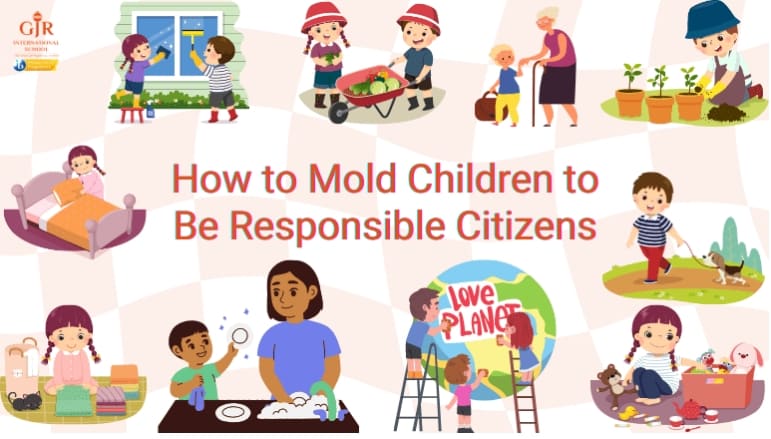
Children are considered as the future of a nation. They are the future leaders, who holds the power to make a change. If we want to contribute to the future we should invest on our children. Molding a child to evolve as a better and responsible citizen should be prioritized. This blog offers insights into the steps that should be followed for the process.
Children lookup to their parents and people around them and tend to adopt their actions. For them learning happens from their surroundings. Adults must always be aware of it and act responsible in front of them to teach them core values from a young age.
Honesty: Teach kids the value of honesty. Be their role model and be truthful in words and actions, when the elders choose the path of honestly children tend to follow the same. Handle situations wisely when the kids confront with a mistake; reacting with anger might make them scared to be honest in the future.
Respect: Treat everyone with respect and dignity regardless of their gender, age, or background. Don’t degrade on insult anyone in front of children. Encourage them to respect everyone.
Compassion: By being compassionate to the fellow beings, the lesson of compassion will be naturally passed to the children. They will follow the same path in their lives.
Civic engagement is the active participation of an individual in the community. The world they are living in should be introduced to the children in a way that is age appropriate and understandable.
Civic learning: Civic learning involves discussing fundamental rights, duties, the workings of the government, and related topics with children. This helps them build informed opinions and perspectives from a young age, preparing them to become active and responsible citizens.
Volunteering: Make children a part of volunteering and community service. Teach them the value of service and how it can make a huge difference in the society.
Political engagement: Engage children in age-appropriate discussions about politics and current events. This can foster their interest in civic affairs and help them develop opinions on important issues.
Make sure to teach the concept ‘unity in diversity’. India is a diverse nation, it is a melting pot of different cultures, practices, religions, cuisines etc. Introducing them to the rich diversity of India helps foster inclusivity, acceptance and tolerance in children.
Build patriotism and a sense of national pride in children by introducing them to the history and culture of India. By understanding their roots children will develop a deeper connection towards their country. Engaging them in national events and teaching about the significance of it organically builds patriotism.
Fostering social responsibility from a young age is crucial for character development. By teaching children proper conduct in public, basic etiquette, and the importance of contributing to society, we can help them become responsible citizens.
Emotional quotient (EQ) is a person’s ability to understand and manage one’s own emotion as well as other’s. An individual with strong emotional quotient tends to cope with adverse situations and stress better and has the ability to make the right call. To improve the emotional quotient a child must experience it first. Show the examples of empathy, consideration, understanding and support while interacting with the kids and others. Also, when there is an incident of low EQ level behavior, use it and educate the kids about the negative consequences and encourage healthy responses.
Foster environmental awareness in children by teaching them that we are interconnected with the planet and responsible for its well-being. Encourage them to engage in conservation practices from a young age, emphasizing the importance of reuse, recycling, and reducing waste. Promote a shift towards eco-friendly habits and instill a sense of responsibility for their actions.
Nurturing a child's development involves a multifaceted approach. Various aspects of life, including education, values, and experiences, contribute to shaping a responsible and well-rounded individual. It is a collective effort to build the young generation to be the future of a nation. As the proverb says, “it takes a village to raise a child”, it is every one of us who influence and contribute to their growth as a responsible citizen.